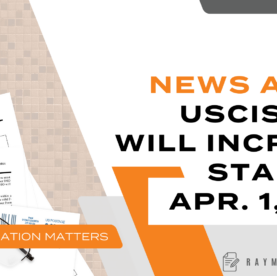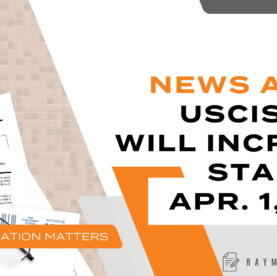Weekly Immigration Round-Up: Public Charge Rule Terminated; Foreigners Previously Barred from U.S. Can Reapply for Visas; Venezuelans Granted Temporary Protected Status

End of the 2019 Public Charge Rule
On Tuesday, March 9, 2021, the Biden administration asked the Supreme Court to dismiss the government’s appeals of court decisions against the “public charge” rule, which had expanded the ability of U.S. Citizenship and Immigration Services (USCIS) to deny green cards to lower-income immigrants. U.S. Department of Homeland Security Secretary Alejandro Mayorkas stated that “the 2019 public charge rule was not in keeping with our nation’s values. It penalized those who access health benefits and other government services available to them. Consistent with the President’s vision, we will continue to implement reforms that improve our legal immigration system.”
Federal judges across the United States criticized the rule and found it to be illegal. However, the Supreme Court had permitted the policy to continue as challenges proceeded before lower federal courts. Immigration advocates have consistently denounced the rule, finding that it instilled fear in immigrants by penalizing those who accessed health care and other vital services available to them. The Legal Aid Society, Catholic Legal Immigration Network Inc., and others issued a statement declaring that “immigrant families can now access life-saving health care, food, and housing assistance for which they are eligible without fear that they will lose the chance to obtain lawful permanent residence.”
Considering this decision, on March 10, the USCIS stated that it will revert to the previous 1999 guidance regarding public charge inadmissibility, and no longer accept documentation related to the new rules.
Visa Applicants Previously Denied Due to Travel Ban Can Now Reapply
On Monday, March 8, 2021, the U.S. Department of State ruled that visa applicants who had been denied under the Trump administration’s travel ban of foreign nationals from 13 mostly Muslim-majority countries can either submit new visa applications or seek new decisions on those denials.
Ned Price, a spokesperson for the Department of State, said those who were denied visas prior to January 20, 2020, are required to submit new visa applications and fees and will be reconsidered under the new guidance. Applicants who were denied after that date can seek reconsideration of those denials without needing to submit new forms or fees.
This decision affects tens of thousands of people who have been barred from entering the United States since 2017 pursuant to the travel ban.
Venezuelans Are Eligible for Temporary Protected Status
On Tuesday, Department of Homeland Security Secretary Alejandro Mayorkas issued an order declaring that Venezuelans are immediately eligible for Temporary Protected Status (“TPS”), which protects immigrants from countries in crisis, provides relief from deportation and permits applications for employment authorization. The relief will last through at least September 2022. Venezuelans who entered the United States prior to March 8, 2021, are eligible to apply. This will have a significant impact in our region: of the 100 towns and cities in America that are home to the largest number of Venezuelans, four are located in New Jersey – in Bergen, Warren, and Passaic counties – and two in Eastern Pennsylvania.
Previously, legislation to extend TPS to Venezuelans had passed the House of Representatives but not the Senate. On his last day in office, former President Trump issued a memo granting Venezuelan refugees Deferred Enforced Departures, which provided temporary relief from deportation, but the move was criticized by Democrats as insufficient. Representative Darren Soto (D-Fla.), who had been a leader in the effort to extend TPS to Venezuelans, likened the memo to “granting them a few crumbs on the way out.” Representative Soto told reporters that TPS “is a far superior status that is enshrined in the statute, unlike the [Deferred Enforced Departures], which is extended at the discretion of the president.”
If you have any questions about this blog post or any other immigration concerns, please feel free to contact me at wcmenard@norris-law.com or 282-544-0022.





